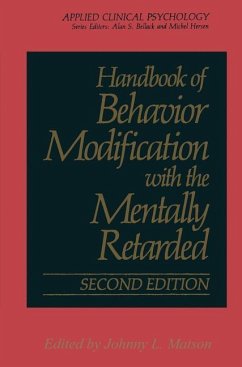The development of behavior modification principles and procedures and the ensuing research have had a dramatic impact on services for mentally re tarded persons. This book is the second edition of a volume that is designed to update readers on some of these many developments. Although many of the chapter titles and authors from the first edition remain unchanged, we have added additional chapters to reflect new areas of research. The book is thus a critical review of this literature and, as such, provides essential and important notions about what we know and what can be done to expand our current knowledge. The authors of the chapters are all recognized experts who have been active in publishing in the research areas they critique. As a result, they have a good understanding of what are the major issues in the field. And because they are also active in service provision to persons with identified handicaps, their material will be especially useful to practitioners and, it is hoped, to those_ professionals who are working in the field in estab lishing data-based treatments. One important change in the field has concerned the terminology used to We are aware that persons with mental retar describe handicapped persons. dation are no longer referred to as "the mentally retarded," and although no disrespect is intended, for the sake of continuity the original title has been retained on the advice of the publisher.
Hinweis: Dieser Artikel kann nur an eine deutsche Lieferadresse ausgeliefert werden.
Hinweis: Dieser Artikel kann nur an eine deutsche Lieferadresse ausgeliefert werden.
`It will be of special value to those in higher education who are interested in research and development in this area. Highly recommended for all professional workers who serve persons with mental retardation and upper-division students in special education.'
Choice
Choice
`It will be of special value to those in higher education who are interested in research and development in this area. Highly recommended for all professional workers who serve persons with mental retardation and upper-division students in special education.'
Choice
Choice








